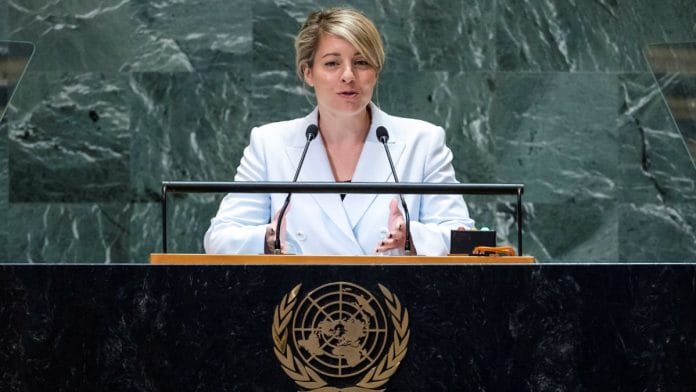New Delhi: Apart from the expulsion of six Indian diplomats Monday, every other diplomatic sanction was on the table, Canadian Foreign Minister Mélanie Joly has said after Ottawa accused the envoys of being linked to murder, extortion and intimidation activities in Canada.
At a press conference Monday, also addressed by Prime Minister Justin Trudeau, Joly said: “So today was a really important step. When you look at what is available in our toolbox, expelling diplomats is one of the highest and toughest measures a country can take under the Vienna convention… Everything is on the table.”
Joly’s comments come after New Democratic Party chief and Sikh leader Jagmeet Singh—a former key ally of Justin Trudeau—called for diplomatic sanctions against India and the banning of the Rashtriya Swayamsevak Sangh (RSS) in Canada as the Sikh community there had been “stalked by fear, threats, harassment and violence”.
Today's revelations make it even clearer.
Modi’s government is engaging in organized crime to murder, extort and harm Canadians on Canadian soil.
Canadian citizens must be protected, our sovereignty respected and our democracy safeguarded.
See my full statement below: pic.twitter.com/6LyjdSr6xb
— Jagmeet Singh (@theJagmeetSingh) October 14, 2024
India ‘withdraws’ diplomats after Canada move
Meanwhile, India said Monday that it had withdrawn these six diplomats from Canada, among them its High Commissioner Sanjay Kumar Verma, after New Delhi received communication from Ottawa requesting the waiver of their diplomatic immunity and their appearance before the Canadian police.
Later in the evening, New Delhi expelled six Canadian diplomats, including the acting high commissioner Stewart Wheeler, deputy high commissioner Patrick Hebert and four others and gave them time till 19 October to leave India.
Hours after India’s statement, Joly claimed at the press conference that the diplomats were first expelled, and that India “subsequently” called them back from Canada.
The Canadian foreign minister also said she was in touch with her Indian counterpart S. Jaishankar, and had requested India to cooperate with the country’s investigation into the June 2023 killing of Hardeep Singh Nijjar—an India-designated terrorist and Canadian citizen.
“We do not want diplomatic confrontation with India… We are asking India to cooperate in the investigation period. They have a way of doing it. They are doing it with the US, they can do it with us as well,” Joly emphasised Monday.
The Canadian foreign minister added that “sitting diplomats” were involved in violent incidents in the country and that violence had “actually increased” after Prime Minister Justin Trudeau’s allegations about Indian involvement two months after Nijjar’s death.
Canada provides no direct evidence
Both Joly and the Canadian minister of public safety Dominic LeBlanc—who also attended Monday’s press conference—refused to talk about specific evidence of the alleged links between Indian government officials and violent crimes in Canada.
LeBlanc pointed out that investigations were still ongoing and the information may come out during the course of the judicial process.
Last September, Trudeau had informed the Canadian Parliament that there were credible allegations linking agents of the government of India with the killing of Nijjar—an Indian designated terrorist who was gunned down outside a gurdwara in Surrey, British Columbia in June 2023.
Four individuals with Indian citizenship have been arrested and charged with the murder.
The Canadian PM’s comments set off a firestorm, with ties between the two countries deeply impacted by the accusations, and the lack of evidence shared with New Delhi.
A couple of months later, the US Justice Department indicted an Indian, Nikhil Gupta, in a foiled plot to assassinate Gurpatwant Singh Pannun—another Indian-designated terrorist living in New York.
New Delhi set up a high-level inquiry into the US allegations after evidence was shared by Washington.
Failed NSAs meeting, Lawrence Bishnoi ‘connection’
At another press conference on Monday, the Commissioner of the Royal Canadian Mounted Police (RCMP) Mike Duheme said that National Security and Intelligence Adviser Nathalie Droun, and other senior officials of the Canadian government, had met Indian National Security Adviser (NSA) Ajit Doval in Singapore Saturday.
The meeting was not satisfactory, Duheme said, which led them to publicly reveal that Indian diplomats were allegedly involved with the Lawrence Bishnoi gang in exacerbating violence against pro-Khalistan supporters in Canada.
On Monday, Trudeau also said that in a “brief exchange” with Prime Minister Narendra Modi in Laos last week, he had urged his Indian counterpart to take the meeting between the NSAs “very, very seriously”.
People familiar with the matter in the Indian government had told ThePrint at that time that no “substantive discussions” had taken place between the two leaders, who were in the Southeast Asian country for the ASEAN framework meetings
(Edited by Tikli Basu)
Also read: Canadian police link Indian diplomats to murder & extortion, say Bishnoi gang working with Delhi







Delightful!!!
Canada must impose strict economic sanctions on India.
This would be a blessing for us and a headache for Canada. Indian economy is not dependent on Canada in any manner whatsoever.